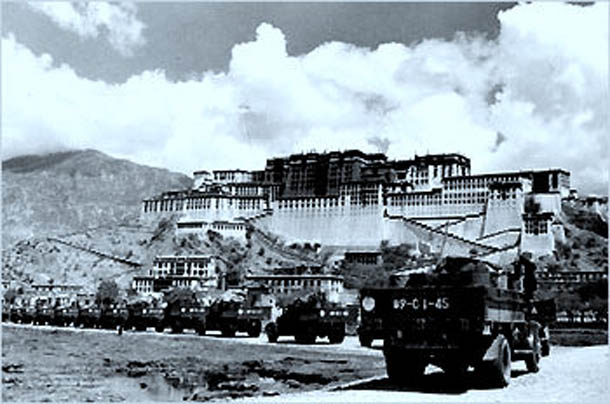 Dharamshala: An exhibition has opened in Chamdo Prefecture, Eastern Tibet, to mark the 60th Anniversary of the Chinese invasion of the region. The exhibition, which opened on Monday October 18, charts the history of Chamdo, and emphasises the region's continued development.
Dharamshala: An exhibition has opened in Chamdo Prefecture, Eastern Tibet, to mark the 60th Anniversary of the Chinese invasion of the region. The exhibition, which opened on Monday October 18, charts the history of Chamdo, and emphasises the region's continued development.
The exhibition, visited by around 1000 people, displays the heritage of Chamdo region with historic photos, multimedia presentations, sand tables, and publications in both Mandarin and Tibetan.
Kelsing, a local Chinese official, praised the exhibition, stating that "a review of the past tells us to cherish the present, and gives us hope for a better future".
On October 19, 1950, Chinese People's Liberation Army troops marched into Chamdo, the capital of Eastern Tibet, receiving limited resistance from the peaceful Tibetan army. The Governor-General Ngapo Ngawang Jigme quickly surrendered, and the following year all of Tibet was under Chinese rule after the controversial Seventeen Point Agreement signed in Beijing on May 23, 1951. Ngapo, who signed the agreement, proceeded to have a long career within the Chinese Communist Administration of Tibet.
Chinese media prefer to view these events as a "peaceful liberation", and emphasise economic progress in the region since then. The GDP of Chamdo Prefecture was 5.8 billion yuan last year, 140 times the figure for 1958.
Qi Fei, the chief of the local transport bureau, said that Chamdo "had no roads in the 1950s", but has 9,164km of roads today, linking 72.5% of all villages. The government is also building an inter-provincial highway to connect Chamdo with major cities in Western China, such as Lhasa, Chengdu, Xining and Kunming.
The exhibition follows the 11th Reba Arts Festival, held in Dengqen County, which featured song and dance celebrating life over the last 60 years. A full celebration of the "peaceful liberation" is to be held on October 23 and is to include art performances and the launching of new construction projects.


![Tibet has a rich history as a sovereign nation until the 1950s when it was invaded by China. [Photo: File]](/images/stories/Pics-2024/March/Tibet-Nation-1940s.jpg#joomlaImage://local-images/stories/Pics-2024/March/Tibet-Nation-1940s.jpg?width=1489&height=878)















